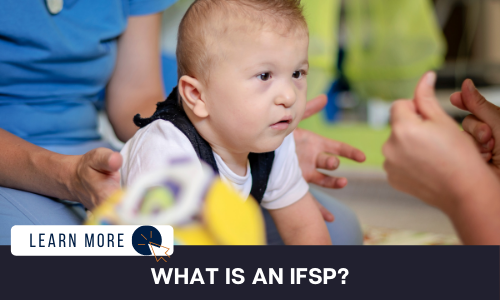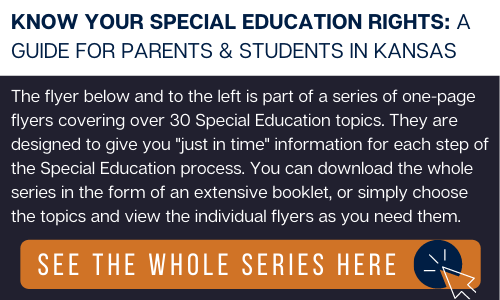What is an IFSP?
 |
 |
PDF Version: Full Guide of all 30+ Flyers (Compiled as a Booklet)
Versión en Español en Formato PDF: ¿Qué es un Plan de Servicio Familiar Individualizado (IFSP)?
IFSP stands for Individualized Family Service Plan. It is a written document that explains what services your child will receive. It is an agreement between your family and your local Tiny K program.. Tiny K is the Kansas Infant and Toddler program, which serves children with disabilities ages birth to three. The IFSP is a plan that will change every year as your child grows and develops.
Who gets an IFSP?
You will have a written IFSP and a family service coordinator who will work with you to create it if you meet these three things:
• Your child is three years old or younger
• Your child has exceptional needs, such as a disability
• Your child is eligible for Tiny K services in Kansas
What is the family’s role in the IFSP?
The IFSP should center around your family. This means that your culture, values, and beliefs will be reflected in the IFSP. It also means that you will be a key part in creating the IFSP. You know your child’s strengths, needs, and preferences/interests. Information you provide about your family will help you and the rest of the IFSP team write a plan that best serves your child.
You can decide how involved you want to be in providing the services listed in the IFSP with the guidance of the other team members. You can also decide which services you want to accept and how involved you and your child want to be in the program.
You should understand everything in the IFSP. Each step should be explained to you as you help write the plan. You will sign the IFSP when it’s written, but only when you are satisfied and you agree with it.
What is an IFSP meeting?
An IFSP meeting is when the team gets together to talk about the plan for your child. The first IFSP meeting has to happen within 45 days of your child’s first evaluation. The IFSP needs to be reviewed every 6 months. Changes can be made when that happens. It can be reviewed more often if it is needed.
You must receive a written notice before an IFSP meeting. This notice needs to come at least 10 days before the meeting. If you do not want to receive these notices, you can decline this option. You can bring any family member or other person that knows your child to the meeting. They can share thoughts and important information about your child.
The meeting needs to happen in a place and at a time that works for your family. In general, the meeting needs to be held in the language that your family uses (Spanish, American Sign Language, etc.).
Sources & Additional Resources:
Kansas Special Education Process Handbook. Kansas State Department of Education.
Kansas Infant-Toddler Services Procedure Manual. Kansas Department of Health and Environment.
Step Ahead at Age 3. Families Together, Inc.
Disclaimer: This fact sheet is not intended to provide specific legal advice. If you need legal advice, please contact an attorney. Only an attorney can give you specific legal advice based on your particular situation. We try to update our materials regularly, but the law can change frequently. This publication is based on the law at the time that it was written. Future changes in the law could make information in this fact sheet inaccurate.
.png)





